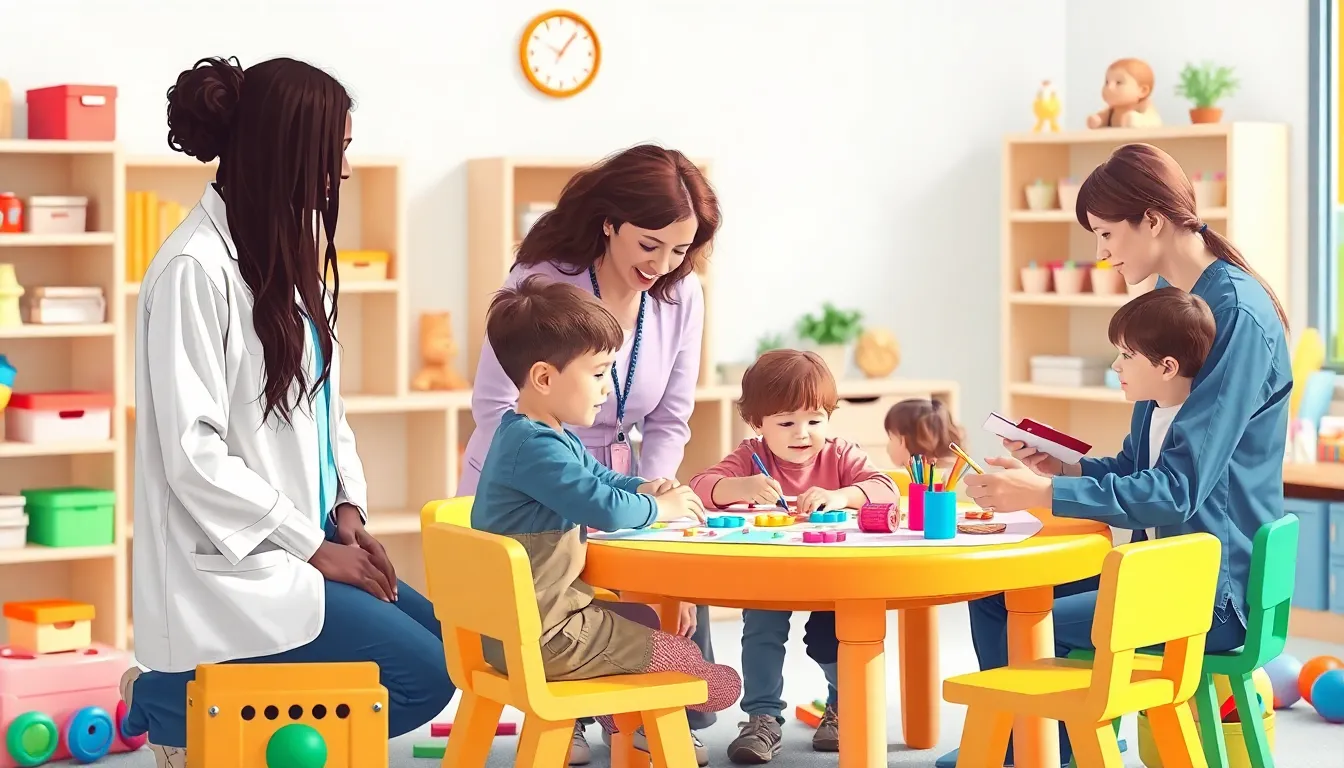In a world where every day feels like a new episode of a reality show, careers in child development offer a backstage pass to the most fascinating drama of all—growing minds. Imagine being the guiding force behind little ones who think a cardboard box is a spaceship and a banana is a phone. It’s not just a job; it’s a front-row seat to creativity and curiosity that keeps even the most seasoned professionals on their toes.
Careers In Child Development
Careers in child development encompass a variety of roles focused on supporting young children’s growth. Professionals in this field play key roles in education, psychology, and healthcare, ensuring children thrive during formative years. Positions such as child psychologists, early childhood educators, and developmental specialists represent just a few options available.
Early childhood educators guide children through structured play and learning experiences. They design curricula that cater to developing minds while fostering creativity and problem-solving skills. This role requires both patience and a passion for nurturing curiosity in children.
Child psychologists assess emotional and cognitive development, addressing challenges faced by children. They conduct evaluations and provide therapy to support mental well-being. Qualifications often include advanced degrees and specialized training in child psychology.
Developmental specialists monitor milestones and provide interventions when delays occur. These professionals work collaboratively with parents, teachers, and healthcare providers to create tailored support plans. Knowledgeable in child development principles, they assess needs and guide appropriate interventions.
Social workers specializing in child welfare advocate for children’s best interests. They connect families to resources and services, ensuring children receive adequate support. Their roles require strong communication skills and an understanding of social systems.
Occupational therapists assist children in developing everyday skills. They create customized activities that enhance motor skills and sensory processing. Professionals in this role often work with children who have developmental delays or disabilities.
Careers in child development provide fulfilling opportunities that impact children’s lives positively. Each role contributes uniquely to fostering a supportive environment for growth and learning.
Types of Careers in Child Development

Child development offers a variety of career paths, each focused on supporting the growth and well-being of children. Professionals in this field can engage in educational, therapeutic, or research and policy roles.
Educational Roles
Early childhood educators foster creativity and learning in young children. They design engaging curricula that promote problem-solving and critical thinking. Preschool teachers often focus on social skills, ensuring children learn to interact positively with peers. Childcare coordinators manage early learning programs, overseeing staff and curriculum implementation. Additionally, special education teachers support children with diverse needs, tailoring instruction to meet individual requirements.
Therapeutic Roles
Child psychologists assess emotional and cognitive growth in young children. These specialists provide therapy, helping children navigate developmental challenges. Occupational therapists focus on enhancing children’s daily living skills through tailored activities. Speech-language pathologists improve communication abilities, addressing speech delays or disorders. Developmental specialists monitor milestones and offer intervention plans, ensuring children achieve key developmental goals.
Research and Policy Roles
Child development researchers study various aspects of children’s growth and learning. They analyze data to understand best practices and inform educational strategies. Policy advocates work to ensure children’s rights and access to resources. These professionals collaborate with governmental agencies and nonprofits to shape legislation affecting child welfare. Additionally, grant writers secure funding for programs that support child development initiatives, making a direct impact on communities.
Required Qualifications and Skills
Careers in child development require specific qualifications and skills to effectively support young children. Professionals in this field benefit from a strong foundation in education and specialized training.
Educational Background
Most roles in child development necessitate a bachelor’s degree in fields such as early childhood education, psychology, or social work. Some positions, including child psychologists or developmental specialists, often require a master’s degree or higher. Specialized certifications can enhance job prospects, demonstrating expertise in areas such as trauma-informed care or developmental disorders. Additionally, ongoing education through workshops, seminars, and conferences helps professionals stay current with best practices in child development.
Essential Skills
Effective communication skills serve as a cornerstone of child development roles, enabling professionals to interact clearly with children and their families. Patience plays a vital role when managing challenges children face on their developmental journey. Creativity fosters engaging activities that encourage exploration and learning. Observational skills are crucial for identifying developmental milestones and tailoring support plans. Collaboration with other professionals also enhances outcomes, ensuring a well-rounded approach to each child’s growth and well-being.
Challenges in Child Development Careers
Child development careers come with numerous challenges that professionals face regularly. Emotional strain often emerges when working with families dealing with difficult circumstances. Professionals must balance their compassion with maintaining boundaries to protect their own well-being.
Additionally, high caseloads can impede a child’s individualized support. Limited resources often restrict the ability of professionals to provide optimal care. In many locations, funding cuts impact the availability of programs and services designed for children and families.
Competition in the field can create obstacles. Obtaining desirable positions may require advanced education and additional certifications. As a result, individuals often invest time and money into pursuing specialized training.
Job-related stress also appears frequently in child development work. Constantly addressing the needs of children, parents, and educational policies can feel overwhelming. Professionals may encounter difficult situations, such as working with children exposed to trauma or facing challenging developmental delays.
Navigating bureaucratic procedures poses another challenge. Managing paperwork, complying with regulations, and securing funding demands diligence and organization. Each of these tasks takes time away from direct interaction with children, which many professionals find most rewarding.
Moreover, staying updated with evolving research and best practices presents a significant commitment. Professionals must engage in continuous education to maintain effectiveness in their roles. This commitment ensures they stay equipped to handle new methodologies, theories, or techniques.
Child development careers come with rewards, but professionals must prepare themselves for these challenges. Understanding these obstacles allows individuals to develop strategies for success and maintain a strong focus on children’s growth and development.
Career Growth and Opportunities
Child development careers offer significant growth and various opportunities across multiple sectors. Educational roles often lead to advanced positions, such as administration or curriculum development, especially for preschool teachers and special education teachers. Therapeutic roles consistently expand as awareness of mental health and developmental needs increases, creating demand for child psychologists, occupational therapists, and speech-language pathologists.
Research and policy positions provide pathways to influence child development practices on a broader scale. Individuals in these roles advocate for children’s rights, pursue funding, and shape initiatives that benefit child welfare. Professional development ensures continuous learning in an evolving field, allowing individuals to stay informed about the latest research and methodologies.
Networking within the child development community helps professionals discover job openings and mentorship opportunities. Associations for early childhood educators, psychologists, and developmental specialists frequently host events, workshops, and conferences, facilitating connections and collaboration. Participants in these activities often find enhanced career prospects and peer support vital for professional success.
Advancing education qualifies individuals for specialized roles with increased responsibilities. Those obtaining master’s degrees or higher often tap into leadership positions or specialized therapy practices, greatly enhancing their career trajectory. Certifications in specific methodologies or areas of development can further boost employment opportunities and increase marketability.
Challenging circumstances in child development settings necessitate resilience and adaptability. Professionals regularly face emotional difficulties and the need for ongoing education, yet these experiences contribute to personal and professional growth. Understanding the complexities of child development not only strengthens skill sets but also amplifies the positive impact on the lives of children and families.
Conclusion
Careers in child development offer a unique blend of challenges and rewards. Professionals in this field play a vital role in shaping the lives of children and their families. The diverse career paths available allow individuals to find their niche whether in education, therapy, or research.
Despite the emotional and logistical challenges, the opportunity to make a lasting impact on young lives is unparalleled. As the field continues to evolve, staying informed and connected through networking and professional development becomes essential. Ultimately, those who choose this path contribute significantly to nurturing the next generation’s potential.

